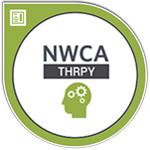PURPOSE
The Counseling/Therapy Professional credential is designed to document the essential competencies for general knowledge of accepted counseling theories and approaches as well as for accepted counseling and intervention techniques and modalities.
AUDIENCE
This credential is appropriate for entry-level counseling professionals working in a variety of arenas including family and marriage counseling, mental health counseling, addiction and behavior change counseling. It may also be appropriate for those working in social work and case management, probation and parole case management, and the criminal and juvenile justice system. Though these individuals do not typically provide therapy, they may benefit from documenting their understanding of counseling therapies and models and intervention techniques and modalities.
JOB/CAREER REQUIREMENTS
Credentials in Counseling/Therapy demonstrate competencies in an understanding of the basic theories, counseling techniques, and intervention strategies needed in order to work with licensed therapists, psychologists, and psychiatrists to meet the needs of clients. These other professionals may not require advanced counseling education and training, but may benefit from having a basic understanding of counseling therapy and intervention concepts. These professionals may include social workers, parole and probation officers, school guidance counselors, and other workers in the criminal and juvenile justice system or other areas. Generally counselors and therapists require a graduate degree in counseling and appropriate training and licensure. Some addiction counseling positions may require only a bachelor’s degree or a specific certification. Requirements differ by position and state.
COUNSELING & THERAPY WORKPLACE TASKS:
- Diagnose and treat mental and emotional disorders
- Encourage clients to discuss their emotions and experiences and listen in a caring, compassionate, and analytic manner
- Help clients process reactions and adjust to life changes
- Guide clients through decision-making processes and steps
- Coordinate treatment and services with other professionals and agencies
- Make recommendations for other services and resources
- Write reports related to intervention plan or approach, needs of the client, and progress
- Assist individuals in working toward their counseling goals
EXAM STRUCTURE OVERVIEW
Number of Questions in Exam: 200
Total Time: 150 minutes
Overall Passing Score: 70%
(All sections require an individual passing score of 70%)

